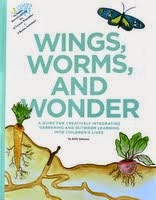The seedlings are growing nicely in the greenhouse, the lettuce is planted and garlic and carrots that were started last fall are growing vigorously. Now it's time to start giving them a little added boost of nourishment with compost tea.
I start brewing compost tea in early May and apply it every 2 to 4 weeks. I use a 4-gallon brewer that I purchased from
Compostwerks. They carry different size brewers which come with premium compost and the food source to add to the tea. They also carry refill kits if you don't have your own compost.
The Compost Tea Brewer
The compost tea brewer consists of a 4-gallon pail, 2 air pumps with air diffusers to aerate the mixture, a mesh bag that fits over the mouth of the pail to hold the compost, fittings and plastic tubing to connect to the air pumps.
 |
| Air diffusers in bottom of pail. |
 |
Mesh bag to hold compost.
|
Brewing the Tea
To brew the tea you first fill the bucket with warm water, about 78 degrees but not warmer than 85 degrees because you could damage the biology in the compost. If you are using tap water that is chlorinated you should run the air pumps for 15 minutes before adding the compost to volatilize the impurities in the water. Chlorine will harm the organisms in the compost so this is an important step.
Next, with the pumps still running, you add the appropriate amount of compost and food source. Mix all the ingredients slowly to reduce clumping.
 |
| Brewing the tea. |
Place the cover on the pail to help maintain the temperature and reduce splattering. The tea should brew for 12 to 24 hours - you get better results if you let it go for the full 24 hours. After the brewing cycle is finished, squeeze out the mesh bag in the pail and you are ready to apply the tea to you plants.
 |
| This is what the finished tea will look like. |
Compost tea should be used within 3 hours of brewing because non-anaerobic organisms may dominate the tea and harm your plants. The tea should smell earthy and have no funny odors. If the tea smells like rotten egg, sulfur or vinegar then the anaerobic organisms have taken over and you should discard the tea.
Applying your Tea
The finished tea can be applied in 2 ways - either spayed on the foliage or poured at the base of the plants to drench the roots. I usually do both.
Applying to foliage - Compost tea contains soluble nutrients that the plants will absorb through their foliage. This is the fastest way for the plant to absorb the tea. It has been said that by spraying on the foliage it will help ward off pests and diseases. I have found that in the past two years of applying compost tea I haven't had any huge infestations of pests like I used to. Last year the only pest problem I had was a pesky mole. The ratio to the dilute the compost tea for spraying on the plants is 5:1 (five gallons water to 1 gallon compost tea). Apply to the top and undersides of the foliage every two weeks.
Applying to soils - The ratio to dilute for applying to roots is 10:1 (ten gallons of water to 1 gallon of compost tea). Drench the root zone of the plants and apply every month. If the soil is dry it is best to water before and after you apply your tea, or apply before a rain.
In Eliot Coleman's book,
The New Organic Grower, he says if plants are healthy and strong they will be less susceptible to pests and diseases. I grow organically and do not use any commercial pesticides or synthetic additives. The only thing I apply to my plants is compost in the spring and applications of compost tea during the growing season. The plants seem to be healthier, more productive and I have had far less pest problems than I have had in the past. I am a believer that compost tea makes a huge difference in growing organically.
You can find more information about compost tea at
Compostwerks.





























